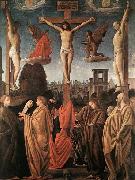Großhandels China Öl Gemälde & Rahmt Ein |
|||||||||||

|
|||||||||||
|
|
|
||||||||||||||
|
BRAMANTINO
Italian High Renaissance Painter, ca.1460-1530 |
||||||||||||||
|
|
||||||||||||||
|
||||||||||||||
|
|
||||||||||||||
| BRAMANTINO
Italian High Renaissance Painter, ca.1460-1530 1515 Oil on canvas, 372 x 270 cm Pinacoteca di Brera, Milan This painting may have come from the church of S. Maria di Brera. At one time it was probably an organ shutter. It was formerly attributed to Bramante. A late work, this painting reveals Bramantino's background. His roots were in the art of Ercole de' Roberti, the most energetically emotional fifteenth- century painter in northern Italy. It is from this source that Bramantino drew his highly dramatic style, which led him to freeze the tragedy of the Crucifixion within a framework of lucid abstraction. At the same time he seized the opportunity to seek out new means of formal expression. The crosses of the two thieves are arranged in terms of a centralized perspective, creating a space almost like an interior, and leading directly to the background where typical Bramantino buildings are silhouetted against an evening sky. (One of the buildings resembles the Trivulzio mausoleum, which was designed by the artist.) The marked bisymmetry of the painting, with angel and demon, sun and moon, is less structured in the choral rhythm of the foreground. The Madonna's grief is represented within the circle described by the hands of the saints, while the Magdalene lifts her arms toward the cross as if to raise it up to heaven. A strict intellectual approach dominates the colour scheme, in which subdued olive greens, golden grays and browns predominate.Artist:BRAMANTINO Title: Crucifixion Painted in 1451-1500 , Italian - - painting : religious |
||||||||||||||
|
Related Paintings to BRAMANTINO :. |
||||||||||||||
|
|
||||||||||||||
|
|
||||||||||||||
|
KONTAKTIEREN Sie UNS |







